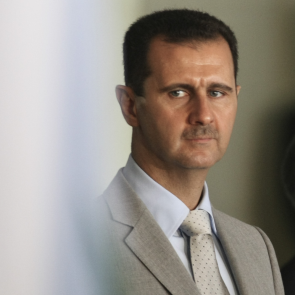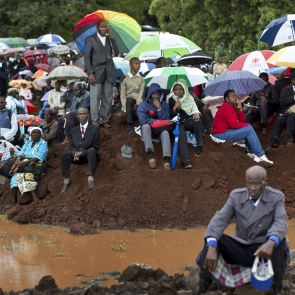A Pope from the ends of the earth has chosen to visit one of the poorest parts of the world at a critical moment.
As world leaders prepare to gather in the major western capital of Paris to try to hammer out a deal on protecting the environment Francis chose to deliver a message to them from Nairobi.
It would, he explained, be a catastrophe if those gathered at the United Nations summit could not confront the effects of climate change.
This is mainly because it impacts the most on the developing world. In Africa the disputes over and plundering of natural resources are at the heart of some of the continent’s bloody conflicts. In the Central African Republic, which he is due to visit on Sunday, much of the fighting is over access to the country’s oil and minerals.
"This patrimony of Africa and of all mankind is constantly exposed to the risk of destruction caused by human selfishness of every type and by the abuse of situations of poverty and exclusion," the Pope said.
As Francis explained in Laudato si’, his encyclical on the environment, care for the planet goes hand in hand with building a fairer world that no longer excludes large groups of people.
POPE FRANCIS IN AFRICA - #POPEINAFRICA...
Talking with Muslims is not optional extra anymore, Francis tells Kenyan faithful
Francis urges defence of women and the unborn at Nairobi Mass
Violence and terrorism fed by poverty and despair, Francis says
Pope Francis begins his vital trip to Africa under tight security
Pray for lacerated world Pope asks as he prepares for Africa visit
Francis to go ahead with trip to African country torn apart by religious conflict
Central African Republic fights hard to persuade Pope to keep travel plans
ITINERARY: Francis to spend 33 hours in war-torn Central African Republic
In his speech at the UN office in Nairobi he said he hoped Paris could come up with a “transformational” agreement which “targets three complex and interdependent goals: lessening the impact of climate change, fighting poverty, and ensuring respect for human dignity.”
The Pope and the Holy See are taking the Paris talks seriously: Cardinal Pietro Parolin, the Vatican’ secretary of State, is leaving Francis’ Africa visit early to be present at them. The decision to come to Paris via Africa is a message in itself. The Pope’s encyclical was published in May of this year in order to try to influence discussions as was his speech at the UN headquarters in New York at the end of September.
The decision to deliver this message from Africa is also in line with the prophetic character of this papacy focussed on the marginalised and excluded. It was the Pope, after all, who travelled to Lampedusa off the coast of southern Italy to highlight the plight of migrants months before their plight became a global news story.
 The security around Pope Francis has been very visible so far on his tour of Africa (PA)
The security around Pope Francis has been very visible so far on his tour of Africa (PA)
Africa is increasingly important on the world stage with its youthful populations and growing economies. It is the place from which many migrants are coming to Europe and is witnessing terrorism from Islamic extremists and violence between religions.
Yet while a globalised world faces common difficulties, power is still in the hands of the few. The Pope has pointed out that no country can act interdependently but in his address to the UN today said a problem arises when interdependence becomes a “synonym for domination, or the subjection of some to the interests of others, of the powerless to the powerful.” Coming to Africa as Western leaders gather is a message by the Pope that power in the world needs to be more evenly fairly balanced.
Finally, while Africa is increasingly important to the world, it is also due to play a bigger role in the Church worldwide. According to Pew Research, there are more than 170 million Catholics living in sub-saharan Africa with the number of Christians expected to double between 2010 and 2050.
"Africa offers the world a beauty and natural richness which inspire praise of the Creator. This patrimony of Africa and of all mankind is constantly exposed to the risk of destruction caused by human selfishness of every type and by the abuse of situations of poverty and exclusion."
SPEAKING TO AFRICA: SPEECHES and HOMILIES - #POPEINAFRICA...
Read all of Pope Francis' speeches and homilies during his trip to Kenya, Uganda and the Central African Republic on The Tablet.
KANGEMI SLUM: The wisdom of poor neighbourhoods
NAIROBI UN: Speech at the offices of the United Nations
NAIROBI MASS: Protecting the family
When he visits the Central African Republic the Pope is due to open the holy door of Bangui Cathedral and anticipate the jubilee year of mercy. This will happen before any holy door is officially opened in Rome or the Vatican.
This demonstrates that Francis wants this year of mercy to make a concrete difference to peoples’ lives. He wants to make a gesture of peace to a country on the margins, ravaged by conflict and badly in need of the medicine of mercy.
Both these messages - on climate change and on mercy - show Francis’ approach from the peripheries to the centre. That the poorest and the marginalised can teach the powerful and the Church should be on the side of the former.
So perhaps we should not be surprised by his moves in Africa. It is what we have come to expect from this Pope.
KEEP UP TO DATE ON TWITTER AND FACEBOOK...
Follow all the latest news and events from the Catholic world via The Tablet's Twitter feed @the_tablet
Or you can join in the debate at our community page on Facebook




 Loading ...
Loading ...
What do you think?
You can post as a subscriber user ...
User comments (0)